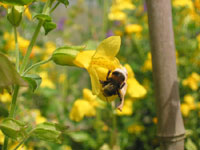
Loss of biodiversity in pollination networks may threaten the persistence of plant communities. (Photo: Fontaine et al.) As animal extinctions continue at the rate of one every 16 years, it's unclear how declining biodiversity will disturb ecosystem dynamics. Of special concern are the pollinators, essential players in the reproductive biology of plants, the earth's primary producers.
These mutually beneficial relationships are sometimes so specialized that the loss of one species threatens the existence of the other, raising troubling questions about the likely consequences of declining diversity in pollination networks. In a new study published in the open access journal PLoS Biology, Colin Fontaine et al. tackled this question by experimentally manipulating plant and pollinator interactions under natural conditions. Their findings suggest that loss of biodiversity in pollination networks may threaten the persistence of plant communities.
For their study, the authors chose plants with easy and harder access to food rewards--three open-flower and three tubular-flower species--and insects with short and longer mouthparts--three syrphid fly and three bumblebee species. What happened? Not surprisingly, the pollinators stuck to their preferred plant: syrphids visited mostly open flowers, and bees visited mostly tubular flowers. Bees can pollinate open flowers but prefer tubular flowers when they have the choice, suggesting that bees may not fill a void left by a different pollinator. The presence of both pollinators allowed more appropriate pairings between insects and flowers--each performing a complementary role--leading to increased pollination efficiency and plant reproductive success.
While the study offers an admittedly pared down view of pollination networks, it demonstrates the value of studying the functional effects of pollination networks in the field. These results show that losing a species affects plant–pollinator communities, and that such losses may ultimately trigger further reductions in biodiversity, possibly reverberating through the food chain. With as many as 70% of plant species dependent on animal pollinators and at least 82 mammalian pollinator species and 103 bird pollinator species considered threatened or extinct, this is sobering news.
Source : Public Library of Science
 Print Article
Print Article Mail to a Friend
Mail to a Friend
